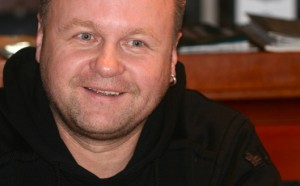VILNIUS — Lithuania needs a band. Especially in times like these.
Ireland, which is the same geographic size and has only slightly more people, has everything from U2 to the Cranberries to Riverdance that people all over the world can identify with the Emerald Isle.
Just across the Baltic, Sweden’s image has been burgeoned by ABBA — I doubt there’s a person in the world that doesn’t recognize the melody to “Dancing Queen.” Otherwise what would you readily associate with Sweden? I can only think of blondes and the welfare state.
Having a native son or daughter break big in the rest of the world can give a nation more than bragging rights, too. It shines a light on the country’s other musicians, filmmakers, writers and artists. It encourages foreign investment in the arts and tourism. Silly people from all over the world go to London just to be photographed walking on the Abbey Road crosswalk (yes, that includes me). Nobody would do that without The Beatles.
I know that Lithuania has many talented musical acts and in the 15 months I’ve lived here I’ve had the pleasure of seeing and meeting many of them. I’m not sure if it’s because of the isolation imposed during the communist years, the record industry’s current malaise or the random luck of the right people just not being in the right place, but there’s no artist most Westerners can readily associate with Lithuania.
As long as humans keep playing music and paying for concerts, if not CDs, eventually this will change, and whoever rises from the gray Soviet-era block apartments to become Lithuania’s international superstar will owe a lot to Bix.
The vanguards
Before there was Sasha Son, Skamp or Metal on Metal, there was Bix.
Hailing from Šiauliai and rising to popularity at the same time as the Sąjūdis movement, Bix gave Lithuania not just political revolution but also “Sex Revolution.” If you’ve never heard the song, you can find the video on youtube.com. Released in 1991, it’s exhilarating hedonism and the song added some Dionysian spirit to the hopeful but also confusing and painful time for Lithuania. It’s importance as an emerging cultural text cannot be overstated. It veered art as far as possible from the previous societal ideal, enforced ruthlessly by state censors, of a loyal party apparatchik done up in socialist realism. Bix helped make Lithuania’s new freedom fun.
Almost 20 years later, the band’s influence here can still be felt. Lead singer Saulius “Samas” Urbonavičius is still on television all the time and the band gets together and plays a live show every once in awhile. One of Vilnius’ best nightclubs, Bix, is named after the band. When I sat down for an interview with Samas, several strangers in the café walked up to him and exchanged pleasantries.

Samas told Baltic Reports that Bix is thankful that fans still enjoy their music so much after two decades. Photo by Nathan Greenhalgh.
“I think I’m proud that now it’s 20 years and when we did a show last year and we had a lot of fun. It was this big concert and it’s so nice and wonderful that people still like us, because for 10 years we haven’t done a new album but it doesn’t matter, people still like us,” Samas told Baltic Reports. “Me and my band, we don’t change the style or main ideas of music. We don’t do pop rock or something or try to get the money from the music to try to be popular.”
Bix’s sound has defied easy categorization throughout their career. Their first album Akli Kariai (Blind Soldiers in English), that has “Sex Revolution,” is a gritty mix of post-punk guitar distortion, dreamy Eastern melodies, Latin percussion and ska party fun. Mixed in with the usual rock set-up are lots of horns and synthesizer.
“The first time we used more horns, trumpets and trombones and we changed for a more rock position, less horns in the last album,” Samas said.
By the time the album 7 came out in 1995, Bix had eschewed ska and horns for a heavier, grungy rock sound. They were also using more English in their lyrics, too.

Samas is a regular figure on Lithuanian television, either on his own shows or in interviews on entertainment programs. Photo by Nathan Greenhalgh.
Many of Bix’s songs can be found on youtube.com and if you like what you hear, their albums are available in record stores throughout Lithuania. Their sound encapsulates a nation breaking out of a cage.
“It was in the revolution time,” Samas said when the band broke out with “Sex Revolution.”
“In this time in Lithuania, there was a political revolution, we got independence. In another revolution, there was freedom, another kind of freedom in sex, freedom of mind, that’s a very sarcastic song,” he said.
If you get a chance, check Bix out live. They’ve always sounded better live than on record, as youtube.com clips will attest.
“We have very good musicians with very good energy — it’s very important. Our live performances have a lot of energy. I feel after the show, that’s it’s a big sport, like I’m playing hockey or something,” Samas said. “Our music it goes from the heart, no lying. If we feel like this, we play and sing like this.”
If you find you like Bix, they’re not the only band of that era worth checking out. Foje, led by the prolific singer-songwriter Andrius Mamontovas is an emotional combination of rock and synthpop while Antis make ska-punk in the same ballpark as Bix but less cerebral.












